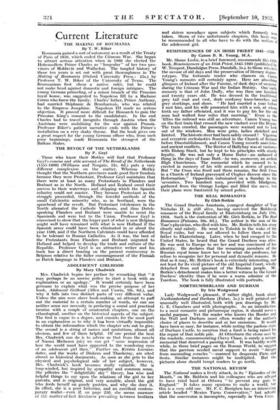Those who know their Motley will find that Professor Geyl's
concise and able account of The Revolt of the Netherlands (1555-1609) (Williams and Norgate, 12s. 6d.) puts a very different complexion on the matter. Whereas Motley thought that the Northern provinces made good their freedom because they were Protestant, Professor Geyl maintains that there were at least as many Protestants in Flanders and Brabant as in the North. Holland and Zealand owed their success to their waterways and shipping which the Spanish infantry could not master. They became Protestant as the struggle proceeded, through the forceful methods of the small Calvinistic minority who, as in Scotland, were the spearhead of the revolt. But Protestant intolerance in the North alienated the Catholic Walloons, and thus Dutch- speaking Flanders and Brabant were unable to resist the Spaniards and were lost to the Union. Professor Geyl is concerned to show that the larger part of what is now Belgium might well have remained with what is now Holland if the Spanish army could have been eliminated in or about the year 1580, and if the Northern Calvinists could have afforded to be tolerant to Roman Catholics. As it was, the best of the Protestants from Flanders and Brabant migrated to Holland and helped to develop the trade and culture of the Republic. Professor Geyl is an attractive writer and his book has a direct bearing on the present controversy in Belgium relative to the fuller encouragement of the Flemish or Dutch language in Flanders and Brabant.






























 Previous page
Previous page